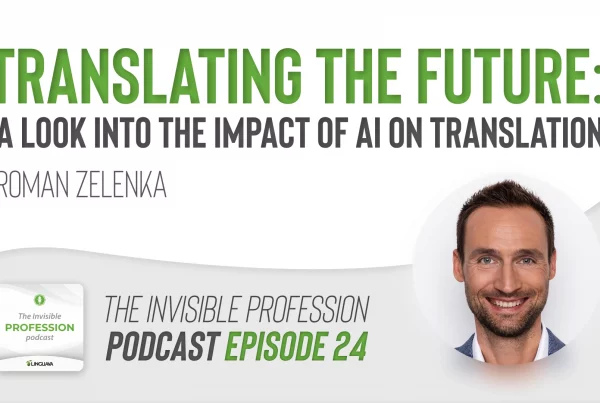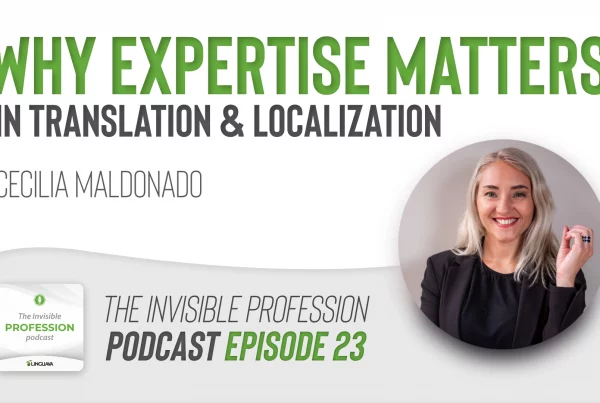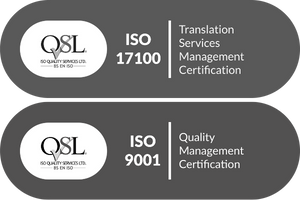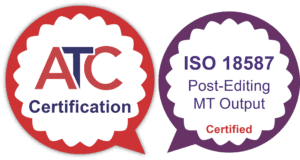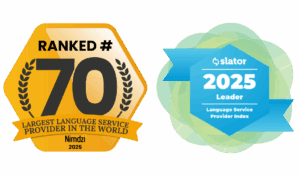What does raising the standard of excellence in interpretation look like, especially for a medical or healthcare interpreter? Expert trainer and Certified Interpreter Eliana Lobo discusses how to raise the bar for interpretation during the global pandemic. The importance of CIFE, how to assess your skill set, the importance of accurate recall, keen listening skills, producing different registers, and more are discussed. Everyone is given the same amount of time in a day, it’s what you do during that time to enhance your interpreting skills that will take you to the next level.
I think of interpreting almost like as a diamond, there are many different facets that we can keep polishing. It’s not just terminology. It’s not just pronunciation in both languages, but there’s so much you can do to continually evolve. – Eliana Lobo
Eliana is a CoreCHI™ Certified Healthcare Interpreter and a Washington state authorized Medical Interpreter. She’s also a certified Trainer of Trainers of medical interpreters. Eliana holds two M.A.s from Brown University in Bilingual Education, and Portuguese & Brazilian Studies. She started out as a Spanish/Portuguese medical interpreter at Rhode Island Hospital in 1980.
Follow Eliana on LinkedIn.
Listen to Linguava’s podcast on all your favorite platforms here.
Connect with us on your favorite social site:
LinkedIn | Facebook | Instagram | Twitter
At Linguava, we are dedicated to reducing communication barriers and providing equity to all members of our community through language access services.
If you are interested in learning more about language access or would like to book a training session, contact us today.
Transcript – The Invisible Profession Podcast Ep. 013
Welcome to the Linguava podcast The Invisible Profession. We give you tools, tips, and resources in medical interpretation and translation that help bring to life our profession and ultimately help improve health outcomes with the Limited English proficient and Deaf and Hard of Hearing community.
David: Welcome everyone to the podcast. Episode number 13. Really excited today to have our special guest, Eliana Lobo, joining us today from Tacoma, Washington, and Eliana has an incredible bio. If you don’t know her already, Iliana is a certified healthcare interpreter and also a Washington state authorized medical interpreter.
She’s a certified trainer of medical interpreters. She holds two master’s from Brown University in bilingual education and Portuguese and Brazilian studies, and started out as a Spanish, Portuguese medical interpreter all the way from Rhode Island. So Eliana, welcome to the show today. Glad to have you here.
Eliana: So glad you invited me to be with you today. I’m very happy to be here. Hi everybody. And to my Brazilian friends. Oi galera tudo bem.
David: Excellent. Excellent. And just for us to get a little bit more of a backstory with, I’d love to hear from you, just in regards to, how did you get first started as an interpreter?
Eliana: You know, I think I share what a lot of older interpreters may share in that I was the youngest member of the family of immigrants. So my English was the best and I ended up interpreting for my grandmother. When I was in fourth grade and she came to the US in a wheelchair, and when we moved back to Brazil, she was walking and doing yoga as a result of multiple surgeries that she has had that I’m the one who went with her to all of her referrals and was with her at the hospital and doing physical therapy with her.
David: So I want to pivot briefly into the, what we’re going through right now. The pandemic. The public health crisis that we’re experiencing which brings us now today, where we have the vaccine here and we’re in group one. And I saw just the other day on LinkedIn, that you got your first round.
So congratulations. And you’re still here. So that’s wonderful.
Eliana: Yeah. Tetanus shot is much worse. That leaves your arm a lot more sore or at least for me, I’ve had no after effects a little bit of soreness, it’s the next day. But you know, nothing like getting a tetanus shot before going to summer camp.
David: Yeah no, that’s true. And I know a lot of it, a lot of interpreters are asking questions about how to get it, you know, Some hospitals are providing for interpreters right now. Some maybe not quite yet. Can you just walk us through real quick, sort of, what was that experience like for you getting, it would be valuable to share because I am no longer on staff at a hospital or medical center.
Eliana: So I am working still because if I’m going to be a trainer, I still have to be taking assignments as an interpreter. So then I know the status quo of what’s happening today and how people are being treated today. And what kinds of patient populations are coming in today? So I still work. I still take assignments in public health as a healthcare interpreter, but I’m an independent contractor, sole proprietor now.
And so are a lot of interpreters out there. And I don’t want you to say that you’re being left out in the cold, because all I did was call my doctor my clinic and say, I want to make an appointment. Why do you need an appointment? Cause I want to find out how to get on the list to get a vaccine. Because I worked as a healthcare interpreter, that’s all I sent to reception.
And she was like, oh you don’t have to. I mean, you can certainly have an appointment if you want one with your doctor. But as a healthcare worker, she just segued right into that without my having to argue it, this is the number you call. And I called and yes, I waited 37 minutes before someone answered.
on hold. So be patient people. If there’s something to do sitting down pay some bills, just keep that call on hold until you get through. Because when I told the receptionist, Hey, I’ve been waiting for 37 minutes. Is that usual? She goes, oh, that’s a lot better. It was over 60 minutes last week. So I can imagine how hard it is for them getting all these irritated people who’ve been waiting forever, but it’s worth the wait. So be willing to wait out that hold period and get through to the referral number given to you by your healthcare provider. I didn’t even have to wait to get to my doctor, my receptionist at the clinic where I see my doctor had the information now, and don’t know if it’s going to be different in different states, depending on whether they view most of their interpreters as part of the healthcare.
I work in healthcare and that’s going to resonate and you should be able to get a referral to make your point.
David: Yeah. And I’m hearing a lot of, most of the large hospitals, at least, you know, in Portland area. are following, following that similar protocol. Did you get yours in Tacoma, Washington?
Eliana: Yes, I did. And if you work for big agency, I don’t know if the agencies are participating in some places. They are some places they aren’t. I was just able to go directly and I would suggest you try that first. And then if no joy, or if it’s taking too long, go to the big agency in your area and see if they have a connection to get their team of independent contractors.
David: Yeah, that’s one of the things we’ve been doing as well at Linguava is talking to all of the language access managers at each hospital and asking them what’s the plan and what’s the best process and way in which our freelance interpreters can get the access. And most hospitals have that plan that they’ve been able to share, which we’ve been able to share with all interpreters as, as well.
So that’s. That’s awesome that you got it. And then you’ll be getting around round two and it went in a few weeks. And did you get a date when you were getting the first one?
You’re not allowed
Eliana: to leave. You have to sit for 15 minutes after you get the shot to make sure you don’t develop any side effects and you’re not allowed to leave at least here until the second appointment is booked. So really they would have. And then you leave with your little card filled out again. And we’ll be able to travel again. I can’t wait.
David: Oh, that’s exciting. And as far as you said, as far as, you know, pain very little side effects.
Eliana: Really not noticeable. I had nothing yesterday this morning. I noticed as I was washing my hair a little bit of tenderness, but like I said, tetanus shots that I’ve gotten in the past hurt a lot more.
It’s not like I have a golf ball embedded in my arm or something. Really.
Yeah. So that’s good. It was one of the things, you know, I think about when we’re talking about. The vaccine where my mind goes is I’m thinking about the limited English proficient community. And I’m thinking about the deaf and hard of hearing community.
There’s so much information out, right? You know, on, on the TV, on internet, you know, there’s content every day, you know, you could read a different story depending on where you go in regards to what’s available. What are the risks? How do you get the vaccine, all those questions that we’re, you know, we’ve all asked ourselves too.
So I think about how is that information being disseminated to, to those who. Maybe our limited English proficient or the deaf and hard of hearing community. So my question for you would. What advice would you give to the hospitals in regards to providing meaningful language access during this public health crisis?
What should they be taking into consideration to ensure that’s happening?
I would hope they would have a patient family education committee somewhere within the hospital, because that’s what this is right in their wheel house. How do I get the information out? How do I make sure that the phone tree isn’t only in English?
How do I make sure I have translations? How do I pressure the pharmaceutical companies who have big budgets? To roll out directions that have already been translated and how do we come together so that each and every hospital isn’t spending money to translate the same directions? Why can’t we pool that resource?
So I’m going to recommend two resources on opposite coasts. The group that’s called focus F O C I S out of Massachusetts. And I’m sorry that I don’t know what the acronym stands for. Acronyms are the bane of my existence. Get in touch with someone at Cambridge Health Alliance, like Vanessa Costa and get the link to the FOCUS translated materials around the immunization and around coronavirus in general, if you’re on the east coast, because that language group reflects the higher demand languages that are more east coast in nature. And then here in Washington state, we have a great group called WASCLA the Washington state coalition for language access that put together translations of very good quality for the same thing, immunizations and coronavirus. And that organization is run very by a very able and dear person, Joanna Ramos. And if you put in WASCLA in Google, you’ll find it. And again, those translations reflect languages that predominate more on the west coast, and it’s not going to cover everything, but it’s a place where you can at least get that reliable information for the highest demand languages, and then do what you can within your organization.
And your patient family education, outreach communications resource library falls under, you know, into different buckets and different places. This is usually a place where family can come and learn more about a patient’s condition, or sometimes they have classes and I would go there and seeing what they are collecting on this topic because that’s their job.
David: Yeah no that’s excellent. Thanks for sharing that too. And when you’ve been interpreting during during COVID what have you seen that the patients you’re interpreting for? What are they experiencing that might be different, you know, during this time and what should we, as interpreters be aware of, or even healthcare providers be aware of?
When we’re servicing. The LEP community during this time?
Eliana: The most obvious is the pivot to telehealth. Many more appointments are being done remotely than used to be. And the challenge there is getting the patient and their family to understand how to access the platform and manage the platform.
But I do interpret quite a bit for children’s hospital here in Seattle and the concern there and still in person, although far less frequently this year than in the past. And the concern there has always been. They’ll take your temperature at the door and check to see if you’ve been symptomatic of cough or fever or anything before they let you in as a routine over the years. So that hasn’t changed as much there as it has in other places where you’ll be met by a medical assistant or something at the entrance to the clinic. And given a mask, if you don’t already have one or asked to swap a mask, if you’re wearing a gator or one of those less efficient forms, and your which will be taken before you let in for an appointment.
So all this extreme technological stuff does dilute a little bit and does take away some of the focus. People are flustered. And I think it’s more important than ever for interpreters to still uphold the standard. And we can often be connected and people are already halfway through changing the dressing or whatever it is that is going to happen there.
Say it’s hard to get that pre-session in, but you can do it in three sentences and you can rattle it off very quickly. By saying, hi, I’m Eliana your Portuguese English interpreter. So reading name, language check. Right. Please speak directly to each other in first person and know that I’ll interpret everything and keep it confidential.
Whoa. We got first person directly to confidentiality. I mean, if that’s all you can get out and then repeat it in your language, your second language, you will get things going in the right direction. We can get all of that out in 10 seconds.
David: I love to hear you say that, cause I’m a huge fan of CIFE as well. And it’s so important just to, to clarify, even if it’s just 10, 15 seconds.
What my role is here today. Cause I don’t know your experience working with interpreters. Maybe you have a lot of experience, maybe you don’t. So if I help clarify what my role is and it’s always going to be the same, you know, consistent Experience, you know, it should be a time after time.
Eliana: I’ve seen so many specialists come in and out that it’s like, they’re overwhelmed. So to take that moment out to say what I have to say and repeat it in the language, gives them like a wake up call. Oh, this is different. This is not whatever it is. You know, respiratory therapy nursing.
David: Why is this person here? Yeah. Yeah, no, that’s I love to hear that. Anybody we can’t preach that enough. So pivoting slightly here. I know you’ve, you do trainings all over the country and you speak in different conferences and at different webinars. And so one of the, one of the presentations that I saw that you did, I want to ask you about was how to self assess your skillset.
And I want to ask you about that for us as medical interpreters what should we be thinking about? Where do we start there?
Eliana: I do a three hour workshop called Pusher Performance and the how to self-assess your skill set is a condensed, one hour, telling you what it is without really letting you do it.
That hour is to practice many different things. I think of interpreting almost like as a diamond, there are many different facets that we can keep polishing. It’s not just terminology. It’s not just pronunciation in both languages, but there’s so much you can do to continually evolve. How long you can pay attention without having any internal distraction.
That’s something you can actually learn how to lengthen. Just like you can work on accurate recall in your memory of three to five items, five to seven items, eight to 10 items. You can gradually stretch all of that by setting those stretch goals. Yeah. It’s not just focused on attention. It’s not just listening skills because if you don’t hear it, you’re never going to say it.
And then it moves past to the actual mechanics of producing, converting and producing different rates of speed different registers. There was lots of ways, almost like a cat’s cradle to keep working your skills. And it’s an ongoing thing. I tell people once we’ve shared and practice in the workshop on many of the different exercises, It doesn’t have to be onerous.
You don’t have to say, okay, now here’s the hour of day. I’ve set aside to practice my interpreting skills and march sadly off to the study, I try to incorporate a lot of this practice of the skills and drills aspect into those boring times of day, whether I’m vacuuming or I’m raking in the yard.
It used to be drive a lot more and got stuck in traffic. You can always find a talk radio station and put something on and practice your shadowing, practice, your interpreting those moments in the day, whether it’s commuting time, waiting online, or waiting on hold for 30, 37 minutes to get your vaccine.
There are a lot of things you can do to work that practice in an. Always finding ways. It mean so much. So my daughter, when she was 14, 15, and would say, oh, can you pick me up at the mall? And I would say, sure. And she’d say but don’t do that thing that you do in front of my friends, which is what I stop at a red light, just immediately find some talk and start shadowing or start interpreting what the person’s doing.
I’m not doing anything anyway, just sitting here. Okay, honey, I won’t embarrass you in front of your friends. You can work it in and then see like, everything is always sharp and what it all rounds back to all the different exercises, all the different trainings. Is it 85, 90% of them are linked to you, recording yourself while you do them.
And then listening to yourself and identifying what gives me trouble. Where do I always get stuck for me? I know it’s numbers and acronyms. So guess what? Note-taking workshops and you learn how to get that stuff down in a reliable way, because I don’t remember that acronym means upfront and you write it down for yourself so that every time it comes up later, And then discussion, even though it’s new, you get it right.
There are little things you can do to make yourself perform better, but it involves being willing to take a good hard look at yourself and a good, hard listen to yourself in order to. What it is that you want to modify, and you don’t necessarily have to work on the things that are most challenging.
You can take the things that you enjoy or Excel at and make them even better doing that either. So there’s lots of ways to approach. How to change the shape of your, on the job performance and it never ends. There’s never going to be a day when you say you’re done.
David: And it’s so true. And I, you know, I talk with lots of interpreters and expert trainers like yourself on this podcast.
And one of the things that stands out that I thought about when you were just sharing that. Sometimes interpreters will say you know, there’s not a whole lot of room for me to grow in this profession. Right. Or, you know, but the more time that we’re spending. And I’m really what you’re talking about is ultimately time management, right?
We all have the same amount of time in the day, right? We all 24 hours, it’s all about how we utilize that time. Are we spending time on our phone or we spend time watching TV or Netflix when we could be doing something that’s going to help us grow if we’re spending that time, like you said, I mean, I love that you said, you know, you’re in the car.
Even if you pick picking up your daughter, you’ve got. You’re working on shadowing. Why are you doing that? Because you’re a pro because you’re an expert and you’re taking yourself to the next level. So if we, as interpreters embody that mindset, doors will start to open for you because the better you become, you could go more in a direction of training.
You could go more in a direction of more simultaneous type jobs entering into a new, a different industry for interpretation.
Eliana: Interpreting for education is starting to blow up everywhere. Parents are stressed, this remote learning from home. I’m not sure I could teach my own child any math past fifth grade.
They need help. And the PTA and the schools are hearing about it. And guess what? They’re coming face to face with the fact that a lot of this has to do with the fact that people can’t log on or don’t understand that there’s multiple platforms for this one class that need to be explained or need to be on the website or directions for how to access on your phone, because a lot of people are using smartphones to access that it’s just not as intuitive and needs to be explained to somebody in their first language.
Yeah. It’s an area where I’m seeing many more calls for appointments than ever before.
David: Yeah. And there’s opportunities for growth in our industry and in our profession. And I think it ultimately comes down to, what do you want that growth to look like? Where do you want to go? And then in setting those goals, setting those smart goals for yourself, and then having put in the time, put in the work to make sure that you get there.
Eliana: So, you know, I am going to make a pitch for people to get certified. That’s a step up and it’s not everywhere, but many may places will have a pay differential for certified interpreters, nationally certified interpreters. I live in Washington state, which has a state level certification through DSHS. And then, so that’s one big grade and then the national certification gets you up.
Another step as does a degree in interpreting or translating, which was impossible to get back when I was an undergrad, you had to major in a language. But nowadays there are multiple programs from east to west coast that are high quality, where you can get a bachelor’s or a master’s in interpreting or translation.
And I don’t want to put a big, heavy tuition burden on anyone but if the idea of getting a degree in this field appeals to you it’s inexorably going in that direction. Interpreters are getting younger. Their children now have immigrants who grew up speaking the language, heritage speakers at home, rather than the direct immigrants and refugees straight from the country.
It’s inevitable that if more community colleges offered that associate degree, a certificate program, that’s going to be available at a very affordable price and we’ll make things happen from there on and, we’ll find sponsors, you know, apply for scholarships. There’s grants, there’s professional organizations that offer scholarships.
So I encourage you to pursue this. It’s interesting. And if you think you’re good at it, there’s nothing wrong with setting that next goal.
David: Amen. Well, you heard it straight from Eliana. The expert trainer herself. So listen to her. I wanted to ask you just, you do lots of trainings and webinars presentations and things like that.
What’s the best way for people to, to get in touch with you. If someone wanted to ask you questions directly or connect with you. Is that LinkedIn or the best way?
Eliana: I’m on LinkedIn and I run a small group on LinkedIn called Seattle medical interpreters. I’m on Facebook too. And I also volunteer with the national council of interpreting and healthcare and with the certification commissioners for healthcare interpreting So the NCIHC website.
So if you put NCIHC webinars in Google, it should get you to the landing page for the webinars series and scroll down because there’s like 50 archived webinars members have access to all of them for free and except for the first two, because when we started, we didn’t realize we needed to get the approval for continuing education credits or it was early on in the process enough that they weren’t even being issued yet.
I think 48 of the 50 webinars are eligible for continuing education units for both. Certainly for CCHI and RID. And I think a handful of like six or eight of them also offer continuing education credits. And the membership fee is really affordable. If you divide that out by the number of trainings, you know, you’re getting each training for a couple of dollars satisfy any kind of requirement of a 32 credits or more just from that archive. But the regional organizations, like the one in the Northwest is called NOTIS Northwest organization, Northwest translator and interpreter society. I’m always trying to say that acronym and failing. They offer trainings online and that you can sign up for the, for CE’s. CHIA offers them too.
CCHI offers them too and if you look in your local area and if you just do interpreter organization and your state name, you should be able to come up with the regional or state organization and see what they have to offer, because all of these presentations at conferences, for example and the webinars offered online by the organizations are less expensive in general than taking classes at a college or university.
And it’s a good way to meet other people locally that work in your field so that you can have a group that you can tap and say, you know, I have to, how do you say this though? Say Bingo Graham in Chuukese, which sometimes has a very different name. And sometimes it’s exactly like it with an O on the, yeah, no.
David: And I have to say too the NCIHC webinars are really high quality and there’s a great one coming up that I’m excited about two part series, second part coming up on January 27th. In regards to. This is the one in regards to managing interpreter services through a public health crisis, very applicable for this.
So, so Eliana, one last question for you here is, you know, you’ve given us lots of golden nuggets today that we can all, I’ll be thinking about things that we can apply to us as interpreters or medical providers. What does that, what is the one, one message that you’d want to leave with with the community today?
What does that what is the one thing you want people to walk away with?
Eliana: Don’t feel alone. I know right now, most of us aren’t having the contact with people that were used to having. By and large interpreters are pretty gregarious and we like being with other people and we like helping people and doing it remotely is not nearly as satisfying as having that, you know, Peds patient run up and give you a hug when they see you, because mommy’s always relaxed when you’re here.
Hang in there, join some organizations. Okay. Lots of groups on Facebook and some of them will even have a happy hour where everyone makes their own drink at home and they get online. And just talk about things in general, don’t lose your connection to the community because I think we are really feeling that isolation.
I know I am, and I see students every day online and I am very thankful for them. And. Being able to see people interacting with their babies and their kids. It’s all something that’s missing. My kids are all grown up and I get to see it vicariously through these zoom and Google and Go to or WebEx and Moodle and canvas and every platform that I’ve been on this year.
But I’m very grateful to have this interaction and take advantage of the fact that during the pandemic. There are a lot more free offerings. Try a webinar. If you haven’t done one before or take the risk and bunk down your 50 bucks, or I’m not sure I’m quoting the right price either for a national council membership and open up that archive library of trainings and pick the one that appeals to you the most, like I said, there’s nothing wrong with working on the parts that you enjoy the most, you don’t always have to pick the things that give you the most difficulty. It’s a tough year. Everyone in my class right now is getting a pass. If you miss an assignment or if it’s late, you can redo it. If you don’t like your grade on the test, you can take the test again, this is a tough year. I’m giving everyone as much slack to succeed as possible. And I want us all to do that for ourselves.
David: Be generous to yourself and say,
Eliana: You’re worth it, the community needs you.
David: Yeah, that’s so true. And you’ve given us a lot of inspiration today, Eliana. And just like you said, you know, the community does need great interpreters who are committed to the profession and committed to the community. So thank you for being a real leader and just a language access champion that we all we all look up to and you know, the work that you’re doing and the trainings that you’re doing are helping advance our profession every day. So, so thank you for your commitment to to language access and to to us as interpreters that helping everyone just raise the bar.
Eliana: Thank you for your kind words, David. That means a lot. Thank you everyone for checking this podcast out. I’m sure there’s many more interesting ones to come and for my Brazilian cohort out there Um beijo! Chao.
So if you haven’t already be sure it like and subscribe and so you can stay connected and getting more content just like this.
So thanks everyone for joining.


